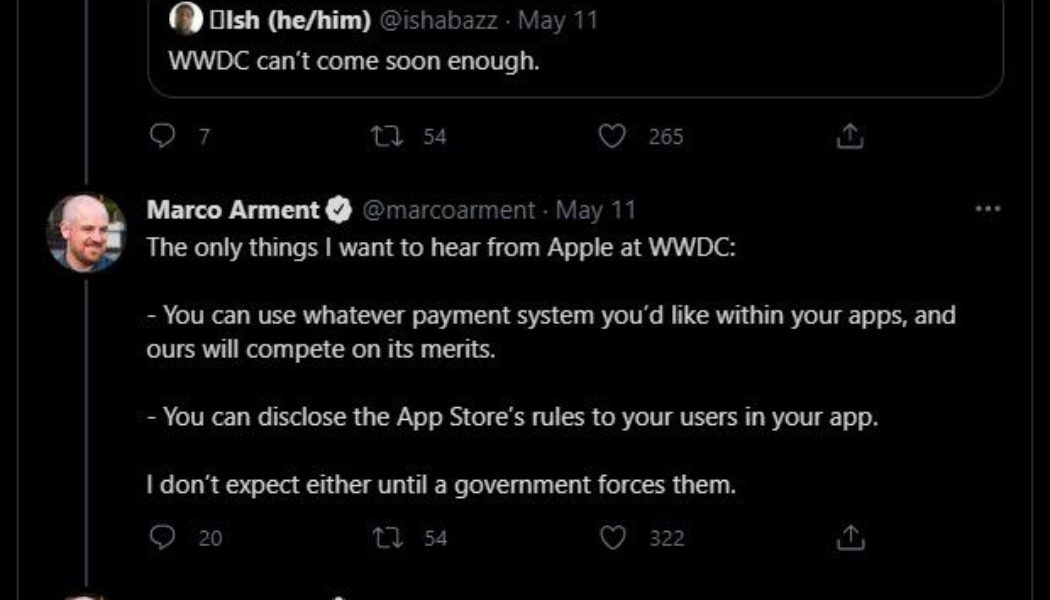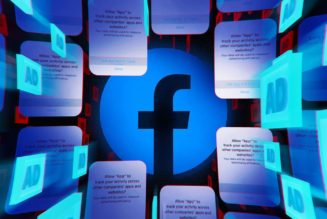Apple needs a distraction, and it needs one fast.
On Monday, the company will hold its annual Worldwide Developers Conference (WWDC 2021) during one of the most fraught moments for developer relations in Apple history. While Apple emerged from the Epic v. Apple trial in a seemingly strong legal position, its reputation took a body blow. Evidence revealed the company doesn’t “treat every developer the same” — it cut special deals with big companies like Amazon and Hulu and made arbitrary, cutthroat decisions to lock competition out and lock users in.
Developers have known or suspected these things for years, and at first, online reactions seemed muted. This is the third year in a row that the shadow of antitrust regulation has hung over WWDC, after all, and so far the company has largely emerged unscathed.
But Apple watchers were hearing something else in the company’s testimony during the trial, something even devout developers couldn’t ignore: Apple was building its case on the idea that Apple, not developers, was solely responsible for the success of the iPhone.
Some of those developers are now supremely unhappy. So it would be fortunate if Apple has a new MacBook Pro waiting for them, one that could swing the conversation at WWDC away from difficult questions about whether the App Store is fair.
:no_upscale()/cdn.vox-cdn.com/uploads/chorus_asset/file/22639655/marco_1.jpg)
On May 21st, Tim Cook himself made Apple’s position crystal-clear: “I view that we are creating the entire amount of commerce on the store,” Cook told Judge Rogers, when she questioned whether Apple didn’t necessarily deserve all the credit for keeping users around. Later, Cook insisted Apple would get paid no matter what gets decided in court: “We would have to come up with an alternate way of collecting our commission,” he told the judge, if alternative app payment mechanisms become a reality.
We’ve seen rent-seeking behavior from Apple in the past: remember when it forced Hey, WordPress and others to add in-app purchases to their free apps, many of whom were too scared to speak up? “These apps do not offer in-app purchase — and, consequently, have not contributed any revenue to the App Store over the last eight years,” the company told Hey developer Basecamp, as if paying rent was the only value that Basecamp had ever brought to the iPhone. Now, we’re learning that entitled perspective goes all the way to the top.
I thought Nick Heer put it well:
If you thought before that Apple was an overly controlling corporate giant that squeezed money at every possible opportunity, its executives’ testimony reinforced that. Even if you are comfortable with Apple’s business case, Tim Cook’s cold remarks must have shaken some of that confidence.
And this past Wednesday, when Apple issued what his fellow podcast hosts called a “self-serving puff piece,” prominent iOS developer Marco Arment apparently decided he’d been shaken enough. “[T]o bully and gaslight developers into thinking that we need to be kissing Apple’s feet for permitting us to add billions of dollars of value to their platform is not only greedy, stingy, and morally reprehensible, but deeply insulting,” writes Arment, in a fiery new blog post titled “Developer relations” that’s sweeping through Apple’s dev community just days ahead of the show.
“It isn’t the App Store that has enabled all of the commerce on iOS,” Arment challenges Cook:
It’s the entire world of computing and modern society, created by a symbiotic ecosystem in which Apple played one part alongside many others. The world was already moving in this direction, and had Apple not played its part, someone else would’ve. The App Store is merely one platform’s forced distribution gateway, “facilitating” the commerce no more and no less than a web browser, an ISP or cellular carrier, a server-hosting company, or a credit-card processor.
This is the part where Apple would argue that the App Store is far more — it’s designed to be a safe, curated, trustworthy experience where you can download apps without fear, which takes investment and a lot of work. But as we learned during the trial, the head of Apple’s own FEAR (Fraud Engineering Algorithms and Risk) team believed that Apple’s App Review program was a joke, “more like the pretty lady who greets you with a lei at the Hawaiian airport than the drug sniffing dog.”
Internal emails also revealed Apple’s own executives couldn’t believe some of the things App Review let into the public sphere, and yet obvious scams continue to flourish today. Apple now says its teams stop billions of dollars in fraud and employ a range of automated tools to detect malicious apps, it also admitted that it only has 500 people reviewing the 1.8 million apps on the store. (500 is not a lot of people to moderate a platform run by the most profitable company in the world, one that made an estimated $64 billion last year from the App Store alone.)
One of Epic’s key arguments during the trial was that the App Store is ludicrously profitable, with margins so high (78 percent) they seem like the “Apple tax” that Apple’s long been accused of creating. And while Apple initially said it would refute that figure during the trial, the company instead repeatedly insisted it didn’t know how much profit the App Store actually makes. The best it could do was lay out a laundry list of things it doesn’t count against its App Store budget and presumably pays for out of the goodness of its heart, such as the $50 million a year it spends on WWDC.
Which brings us to Monday’s developer conference, and how Apple might salvage this mess. Like Arment, I don’t think Apple will suddenly announce that developers can use whichever payment processors they like, or even allow them to steer their customers to ways to pay outside Apple’s ecosystem. There’s also next to no chance Apple will reduce its cut. For one thing, the company’s been very clear about its stance on each of these throughout the trial, and it’s not going to give up until the lawsuit is over (and even then, not until after rounds of appeals.)
Besides, Apple may not feel the need for anything that drastic. While a number of prominent Apple developers and bloggers have gone loud and coverage of the trial may have made Apple slightly less of a media darling — “The Apple Tax is Rotten,” declared Farhad Manjoo at the New York Times — there are plenty of developers who are simply happy to have a business at all. Having surveyed over 380 software developers ahead of WWDC, Creative Strategies principal analyst Ben Bajarin tells me that smaller developers tend to be satisfied with Apple as a whole, and over 90 percent of developers surveyed so far say they’re likely to keep developing for Apple’s platforms.
A few observations from preliminary results from our Apple software developers study.
1. Small developers (those making well less than $1m a year) seem to have much higher positive sentiment toward Apple/App Store than those developers who are larger. https://t.co/Uk1U5gecUu
— Ben Bajarin (@BenBajarin) June 3, 2021
“There are still pain points, everyone wants Apple to do better, but there’s this demographic that recognizes Apple provides them value, allows them to do the thing they want to do by being a small indie developer,” he says. While many survey respondents complained about the app review process and a lack of clear communication from Apple, and the “vast majority” said Apple could be doing more about scams, even the more vocal developers plan to stay. “You listen to these very vocal developers who are unhappy… if a viable alternative existed for them, they’d switch, but Apple’s platform and ecosystem is just such a good ecosystem for them. They won’t go to Android, they won’t go to Windows, because they won’t make the same amount of money,” Bajarin says. There’s no viable alternative.
Prominent dev Steve Troughton-Smith feels similarly, when I ask him what Apple needs to do this year to win developers over: “the realistic [answer] is ‘nothing’ — where are developers gonna go? They gotta stick with the App Store if they want to make money on mobile, and there really aren’t other options.” He says the majority of developers “don’t know or care about the trial, and they’re happy to build apps within the sandbox that don’t try to push the boundaries or run into existential issues — which is totally fine.”
“But I think we’ve lost a decade of innovation at the fringe because of Apple’s nannying, and it gets harder to ignore as Apple is now reaching into apps and trying to dictate their business models,” he adds, referencing Apple’s forced in-app purchases as one example.
Apple columnist and podcaster Jason Snell agrees that Apple “denigrated their developers” during the trial, but also doesn’t expect them to fix that at WWDC: “Short of changing long-held App Store policies, like allowing linking to web sites for alternate payment methods, I’m not sure what they can do other than power through their next round of OS updates and hope developers get caught up in what’s new and forget what Apple said about the role of third-party developers on the stand,” he tells me.
But I’m betting Apple has another way to take our minds off developer concerns, a plan that’s worked for Apple in the past — a shiny new piece of hardware that’ll make the company’s “pros” excited to work on what’s next.
:no_upscale()/cdn.vox-cdn.com/uploads/chorus_asset/file/22407714/Apple_wwdc21_newsroom_article_tile_033021.jpg)
Maybe it’ll be a preview of Apple’s long-awaited AR glasses. That would certainly dominate the headlines and be the talk of the show all week and beyond. While the rumor mill isn’t expecting a product to arrive until 2022 at the earliest, Tim Cook has been talking up the potential of AR for years, calling it “profound,” “huge,” a “core technology,” “as big an idea as the smartphone,” and most recently calling the tech “critically important” to Apple’s future. The company’s own WWDC teaser image above definitely makes me think about augmented reality, that’s for sure.
But a safer bet is that, for the third time in the post-Steve Jobs era, Apple will use WWDC to remind its “pro” users that it knows how to build a Mac at the intersection of power and flexibility. “Can’t innovate anymore, my ass,” said Apple exec Phil Schiller at WWDC 2013, introducing the radically redesigned cylindrical Mac Pro with a quote designed to distract from the actual criticism the company was facing that year.
:no_upscale()/cdn.vox-cdn.com/uploads/chorus_asset/file/14361890/Screen_Shot_2013-06-12_at_4.06.55_PM.1419979641.png)
He also claimed that the 2013 Mac Pro was “without a doubt the future of the pro desktop” and while that turned out to be so embarrassingly wrong that Apple wound up publicly admitting that 2013 Mac was a mistake, the company pulled the same move at WWDC 2019 with its new, improved, and actually-upgradable cheese grater Mac Pro to show — once again — that it’s listening to its most vocal audience.
2021 gives Apple a new opportunity. Five years ago, Apple killed off the beloved MacBook Pro with Retina Display, trading its pro-friendly SD card slot, full-size HDMI and USB ports and deep, familiar keyboard for a new machine with a gimmicky Touch Bar and a set of USB-C / Thunderbolt 3 ports that required dongles to plug practically anything into the machine. Developers were disappointed by its lack of RAM, too. “Apple’s new MacBook Pro isn’t for pros,” I wrote at the time. My colleague Vlad: “The MacBook Pro is a lie.”
Yet the biggest issue with the new MacBook Pro turned out to be its ultra-thin “butterfly keyboard,” a design so susceptible to dust that it inspired its own public apology from Apple, multiple recall / repair programs, and a certified class-action lawsuit. We called it one of the worst buttons ever made, and breathed a sigh of relief when 2019’s MacBook Pro phased it out for good.
But 2019’s MacBook Pro mostly just fixed 2016’s mistakes — and where pros are concerned, 2020’s 13-inch MacBook Pro with Apple’s new M1 chip doesn’t quite get there. It is essentially an M1 MacBook Air with an added fan, the same two ports and the same maximum 16GB of RAM.
At WWDC 2021, Apple can show that it’s listening again, and by Bloomberg’s account, it will: we’re expecting to see a new 16-inch MacBook Pro that brings back the SD card slot and HDMI port, heralds the return of Apple’s beloved trip-friendly MagSafe connector, trades the annoying Touch Bar for physical function keys, and supports up to 64GB of RAM. They’re also expected to include double the high-performance CPU cores and at least double the GPU cores of the Apple M1 chips that already managed to upend our concept of laptop performance late last year.
It sounds like Apple may be giving its professional users exactly what they’ve asked for in a new laptop, for the first time in many years, and many of those pros are the same developers attending WWDC and building for iOS. A shiny distraction won’t help Apple win at trial, or stave off Amy Klobuchar, but it could certainly help change the tone of developer conversations this week at WWDC.










